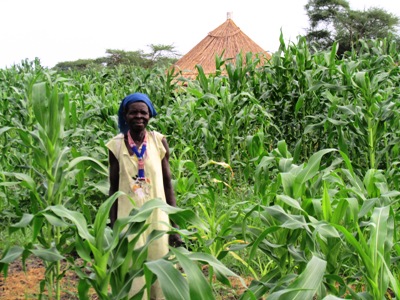WFP contracts Yambio farmers to supply maize grains
September 13, 2016 (YAMBIO) – The United Nations World Food Program (WFP) in South Sudan has contracted a farmers’ association in Western Equatoria state to supply 70 metric tons of maize this year.

“Farmer’s association in Yambio county has been contracted to supply WFP with 70 metric tons and 39 has been supplied. The remaining will be supplied coming months,” said Ezekiel.
He lauded the farmers for successfully planting and harvesting enough crops, which he said would help reduce hunger in the state.
Despite the insecurity incidences recorded in Yambio county, government and community leaders encouraged farmers to embark on cultivation with the aim of storing enough food after conflict.
Purchase of maize, said Ezekiel, was being done through small famer cooperatives, that seek to bring income to them in order to expand their agricultural capability and avail more food for consumption.
“The association doesn’t charge local farmers while purchasing from them because by doing so it will help them get more money and also encourages them to cultivate with interest,” he stressed.
The association reportedly works in partnership with organisations that support farmers with tools, seeds and training needs since most of them cultivate using local hand tools as few tractors are available.
“We as Yambio famer’s association are supporting the famers in various ways because we are working with the government and partners organizations which are supporting agriculture,” said Ezekiel.
“We provide agriculture tools [and] training to farmers at grass root.”
According to the official, the association is likely to realise 300 metric tons of maize and other crops sold to anyone in need of purchasing.
Insecurity, which engulfed Western Equatoria since violence broke out in Juba in 2013, impacted negatively on farmers due to armed groups who entered the bush to fight government forces, hence making it difficult for formers to go to remote areas for cultivation.
South Sudan, for instance, has a wealth of untapped agricultural assets. With 30 million hectares of arable land, across six agro-ecological zones, South Sudan is capable of producing an array of agricultural products, from cereals to oil seeds, horticulture, and specialty products such as Shea butter and Gum Arabic.
But despite the huge agricultural potential it possessed, only about 5 percent of the country’s land is cultivated. Moreover, South Sudan also offers abundant water resources in the Nile basin, and forestry assets are plentiful, with tens of thousands of hectares of teak and other high-value hardwoods available for sustainable harvesting.
(ST)
